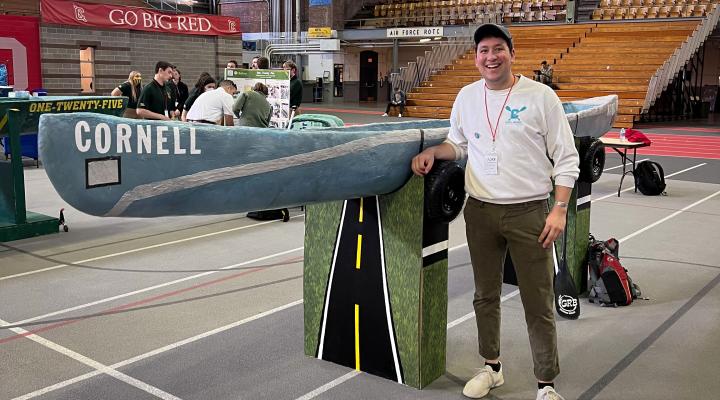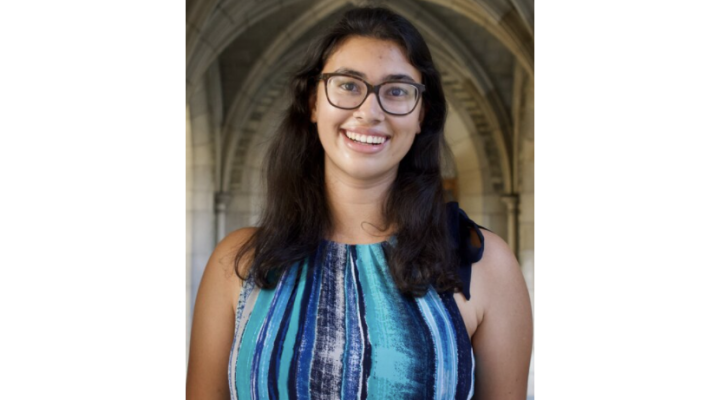Senior Environmental Engineering major Meghan Furton did not know she wanted to spend a semester abroad until she sat to speak with an academic advisor named Melissa Bazley, of the Cornell Engineering Advising Office. “At first, I went in just to talk about my options for graduating early,” says Furton. “It was the end of sophomore year and I realized I had a just a few more credits to take, so I met with Melissa to figure out a plan.”
By the time Furton left the meeting with Bazley, she had seriously begun to consider going to India for a semester as part of the Nilgiris Field Learning Center (NFLC) in Kotagiri, in the Indian state of Tamil Nadu.
“When I met with Melissa, she asked me some good questions about why I wanted to graduate early and what is important to me,” says Furton, who still seems a bit surprised herself that she has been to India and back. “The more I talked, the clearer it became that what I really wanted was to feel like I was making a difference somewhere.”
When asked if making a difference has always been important to her, Furton looks thoughtful for a long moment before answering, “Cornell has changed who I am. I was very shy and very reserved when I got here. But I have been encouraged to follow my passions here. I have joined the water polo club, been an RA, joined the AguaClara student project team, and spent a semester in India. I have a whole new perspective.”
The Nilgiris Field Learning Center is a partnership between Cornell University and the Keystone Foundation of India. It is located in the Nilgiri Biosphere Reserve of the Western Ghats in southern India. The NFLC describes itself as “an interdisciplinary, collaborative effort that explores questions of sustainable environments and livelihoods.” In the course of the partnership, three areas of focus have emerged: the impacts of biodiversity on nutrition and traditional medicine systems, the effects of urbanization on biodiversity in the reserve, and developing systems of governance for effective implementation of conservation, sustainable environments, and livelihood-generation.
“I was part of a group of seven Cornell students who went to NFLC last semester,” says Furton. “We lived in a hostel in Kotagiri and it was such a great experience for me. I was the only engineer in the group.” Furton especially enjoyed the chance to work collaboratively with students from degree programs other than engineering. “Working with non-engineers helped me see the value of interdisciplinary teamwork,” explains Furton. “Their backgrounds were in Urban and Regional Studies, Human Development, Inequality Studies, International Agriculture, and Biology and Society. Because we were all there together, I could see the whole context of a problem and not only the engineering aspects.”
Furton spent a week of her semester in the village of Pajherthottam, gathering data and ethnographic information about water resources, seasonal shortages, and waste and toilet habits. Her week there served to reinforce the importance of understanding the broader context. She found herself asking a question engineers might not typically ask themselves in the course of a water project: How do toilets, dumpsters, and water sources relate to the happiness and health of the people in Pajherthottam?
Now that she is back on campus in Ithaca, Furton is starting think about the next steps. She was surprised at how easy it was to fit a semester abroad into her plan at Cornell. She also seems surprised at how much change can happen in a person in one short semester. Furton decided to come to Cornell because she knew she was interested in Environmental Engineering and Cornell had programs with a strong emphasis on the environmental side of engineering. Once she got here she joined the water polo club. One of her teammates told her about the AguaClara student project team and Furton joined as soon as she could. Since joining, she has done work on the coding team for AguaClara, creating code for the gravity-fed water filtration systems in use in several small towns in Honduras.
“I got to spend a week in Honduras this summer and saw what my coding is used for,” says Furton. “It was good for me to go and understand the whole picture and interact directly with the people who use the system. It is so much more interesting and rewarding than working on problem sets. Seeing how other people live really gives a whole new perspective on my own culture.”
Furton will graduate this year from Cornell’s School of Civil and Environmental Engineering with her Bachelor’s degree in environmental engineering. She will then start right in on M.Eng. program in civil and environmental engineering, most likely with a focus on environmental processes. After that, she is not sure what she will do, but it is a good bet that whatever she does will make a difference in people’s lives.




